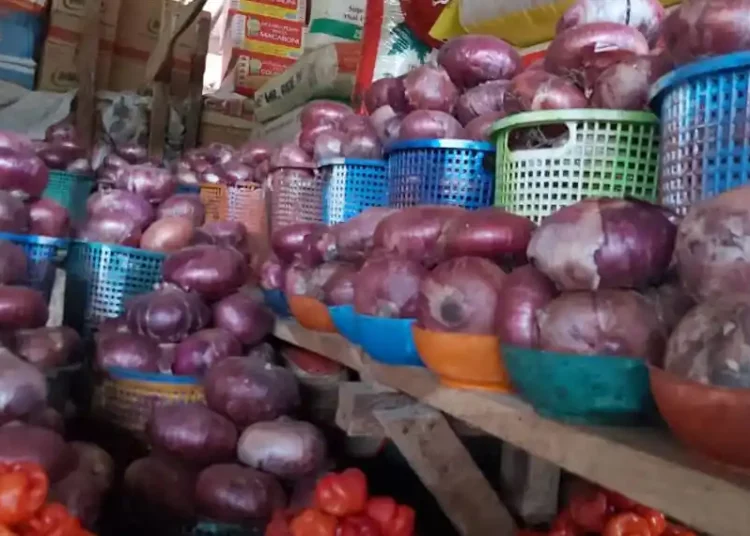The Nigeria Export Promotion Council (NEPC) has revealed that over 1.6 million bags of onions are informally traded to neighbouring countries annually without being reflected in Nigeria’s official export statistics.
This is as the NEPC and the National Bureau of Statistics (NBS) have signed a Memorandum of Understanding (MoU) to begin systematic data capturing of informal cross-border trade activities across the country.
Speaking at the signing ceremony held in Abuja, the executive director/CEO of NEPC, Nonye Ayeni, said the partnership marks a strategic turning point in Nigeria’s effort to grow its non-oil exports by formally recognising and recording the value of trade in the informal sector.
The agreement aims to establish a framework for capturing data from Nigeria’s vast informal cross-border trade sector
According to Ayeni, the figure, cited from the National Onion Producers, Processors and Marketers Association of Nigeria (NOPPMAN), reflects onion exports to countries including Ghana, Côte d’Ivoire, Benin, Cameroon, Congo, and Niger Republic—none of which are captured in formal trade records.
“Existing trade data primarily capture activities within the formal sector, offering limited visibility into informal export trade transactions, despite their significant volume and economic impact,” Ayeni said. “In 2024 alone, formal export records show that 7.291 million metric tons of non-oil products valued at $5.456 billion were exported from Nigeria. This figure excludes data from the informal trade segment.”
Ayeni emphasised that informal trade, often carried out across Nigeria’s porous land borders, is far from trivial. Rather, it forms a critical part of the nation’s trade reality, supporting livelihoods, strengthening regional supply chains, and contributing meaningfully to the economy.
“Informal export trade represents millions of dollars in goods and services that have remained largely outside our official records,” she said.
“Data collected by NEPC state offices across major corridors in Kano, Jigawa, Kebbi, Zamfara, Katsina, Sokoto, Lagos, Ogun, and Adamawa reveal transactions valued at over $31.8 million in some months of 2024 alone.”
She further cited a report from the National Onion Producers, Processors and Marketers Association of Nigeria (NOPPMAN), which indicated that over 1.6 million bags of onions were traded informally to neighbouring countries including Ghana, Côte d’Ivoire, Benin Republic, Cameroon, Congo, and Niger Republic.
“These impressive achievements are not captured in the national export statistics, and that has real implications for our economic planning,” Ayeni said. “It weakens Nigeria’s voice in regional and global trade negotiations. It also denies informal traders—particularly women, youth, and MSMEs—the recognition and support they need to thrive.”
She described the MoU as a targeted intervention to correct this imbalance by capturing the full scope of Nigeria’s export activity, including informal trade flows that are vital to inclusive economic growth.
In his remarks, the Statistician General of the Federation, Prince Adeyemi Adeniran, described the partnership as a critical response to one of the most pressing gaps in Nigeria’s trade data architecture.
“The signing of this MoU demonstrates the strong spirit of collaboration required to tackle the persistent challenge of capturing and integrating data from informal trade and trade in services into our national statistical system,” he said.
Adeniran warned that failure to capture informal trade data undermines the integrity of macroeconomic indicators and weakens evidence-based policymaking. “Traditional trade statistics have focused on formal, large-scale transactions while overlooking the vibrancy of informal trade routes. This must be corrected if we are to align our economic statistics with reality,” he said.
He noted that across Sub-Saharan Africa, informal trade accounts for 20 to 40 per cent of intra-African commerce, with Nigeria playing a central role due to its extensive land borders and regional trading links.
“These are not just gaps in data; they represent gaps in our understanding of economic life and the well-being of millions of Nigerians,” Adeniran said.
According to him, the collaboration with NEPC offers a timely opportunity to build institutional capacity, develop smarter data strategies, and support the formalization of the informal sector. He noted that capturing this data would also facilitate better food security policies, more accurate monitoring of regional integration, and targeted support for small businesses.
“This initiative will position Nigeria as a regional leader in trade statistics,” he added. “It will help us identify new economic opportunities and foster inclusive economic growth by bringing visibility to previously undocumented trade.”
Both agencies committed to deploying advanced data collection tools, conducting grassroots-level engagement, and working with development partners to ensure the success of the initiative.











